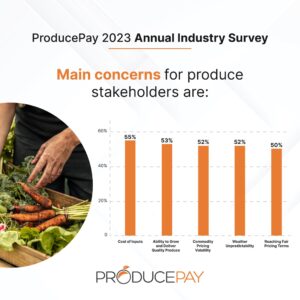Survey highlights challenges facing produce industry
A survey from global produce marketplace ProducePay highlights concerns facing industry stakeholders, including pricing volatility.
The second annual survey of growers, packers, distributors, integrated suppliers and end buyers in the U.S. and Latin America also spotlights other challenges, including the cost of inputs and weather uncertainty, that demonstrate a need to improve predictability for a more efficient, resilient and sustainable supply chain, according to a news release from ProducePay.
 With growers, producers and packers comprising a majority of survey respondents (55%), the data underscores how increasing volatility and unpredictability limit the fresh produce sector as a vital industry for sustainably feeding a growing global population.
With growers, producers and packers comprising a majority of survey respondents (55%), the data underscores how increasing volatility and unpredictability limit the fresh produce sector as a vital industry for sustainably feeding a growing global population.
Commodity pricing volatility
Commodity pricing volatility, a top concern revealed by last year’s survey results, affects the greatest proportion of respondents, with 52% rating it as “extremely significant” to impacting the state of their business, and another 31% rating it as “significant.”
Business stability
A majority of growers (52%), and 30% of respondents overall, rated the stability of their current business climate less positive (5 or lower, on a scale of 1-10), compared to last year.
Business impact
More than half of respondents rated the following concerns as “extremely significant” in affecting their business negatively: cost of inputs (55%), ability to grow and deliver quality produce (53%), commodity pricing volatility (52%), weather unpredictability (52%) and reaching fair pricing terms (50%).
Worsening challenges
These issues were rated worse this year compared to last year: weather unpredictability (54%), cost of inputs (53%), cost or access to labor (46%), commodity pricing volatility (44%) and cost or access to capital (40%).
Concerns about the future
More respondents expect all these challenges to get even worse in the next five years, compared to those who expect things to improve.
Produce waste
Sixty percent of respondents estimate that greater than 10% of their produce is wasted, degraded or damaged due to supply chain inefficiencies.
“The fresh produce industry is critical to feeding a growing world with sustainable and healthy food, and an economic engine for many rural communities across the globe,” Patrick McCullough, ProducePay CEO, said in the news release. “Given the importance of this industry, it’s essential that we support the entire vertical — from grower to retailer — by eliminating the volatility and unpredictability that limits economic growth and investments in sustainable practices, and that results in inefficient forms of waste throughout the supply chain.
“This requires developing tools and new ways of doing business that give growers and buyers greater control of their business by providing unprecedented access to each other, capital, trading, insights and greater supply chain visibility,” he said in the release.
Earlier this year, ProducePay collaborated with one of the world’s largest growers and distributors of table grapes, Four Star Fruit, to launch a direct-to-retail program that enables a stable supply of high-quality produce to consumers while driving financial sustainability and fostering investments in sustainable agricultural practices.
When Hurricane Hillary damaged nearly 25 million boxes of California table grapes, Four Star Fruit and ProducePay took proactive steps to secure table grape supplies from Peru and Chile to bridge the supply gap.
Since its founding, ProducePay has facilitated the trade of more than $4 billion worth of fresh produce across 64 commodities and 17 countries in North America, Central and South America and Europe, according to the release. In 2023, the company is expected to finance more than $1B in fresh produce transactions.







